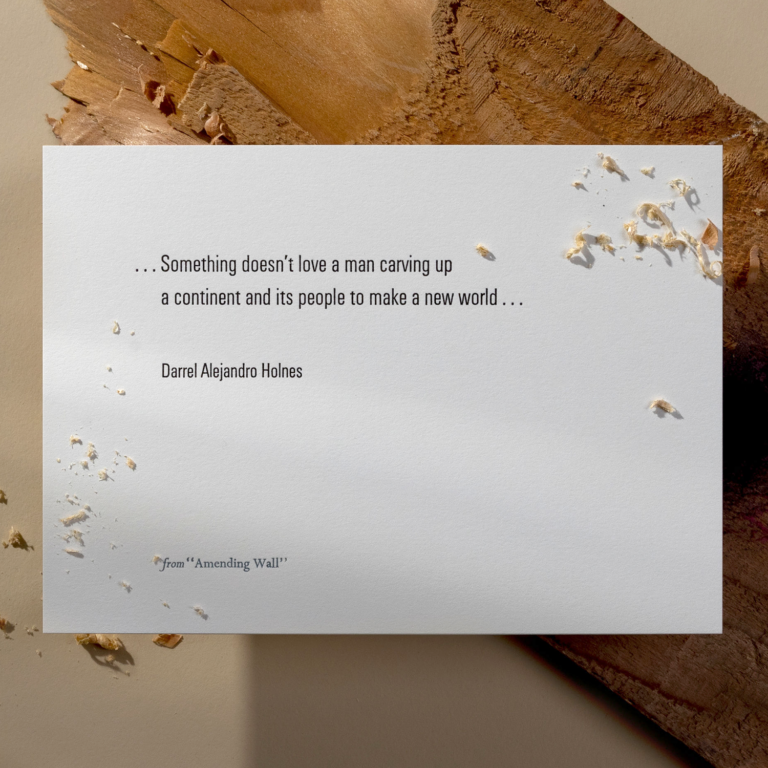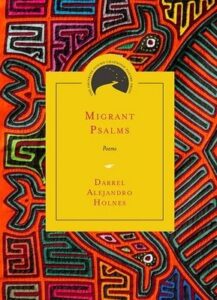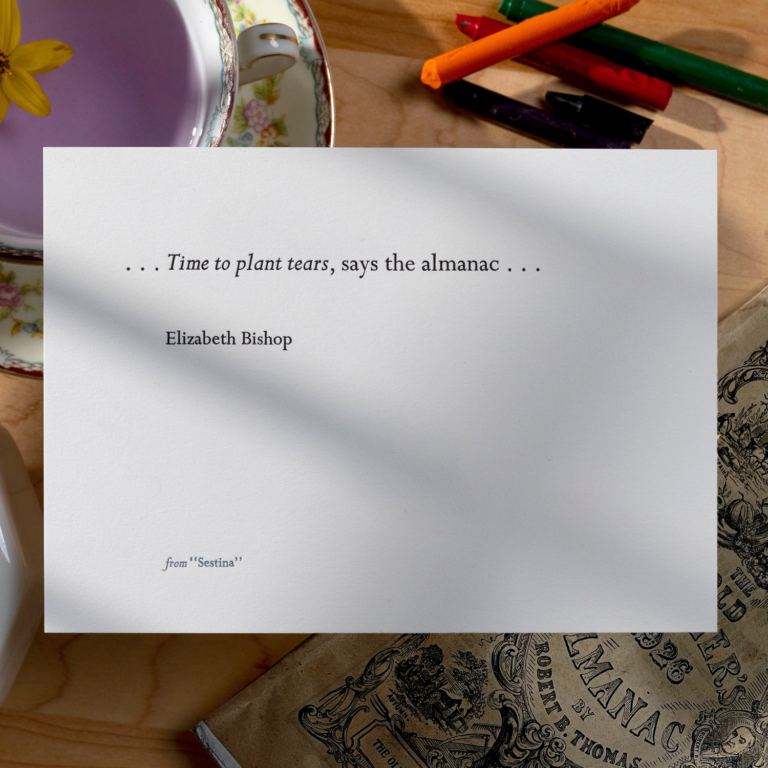Darrel Alejandro Holnes
Amending Wall
In a poem that directly addresses Robert Frost’s “Mending Wall,” Darrel Alejandro Holnes asks questions: who gets to build walls, or guard borders? Do good fences really make good neighbors? Taking a poem that’s been part of an American imagination both of poetry and of citizenship, Darrel offers a critique that places contemporary migrant experiences at the center, challenging contemporary ideas of territory, conquest, and expansion.

Letterpress prints by Myrna Keliher | Photography by Lucero Torres
Guest

Darrel Alejandro Holnes is the author of Stepmotherland & Migrant Psalms. Holnes is an Afro-Panamanian American writer, performer, and educator. His writing has been published in English, Spanish, and French in literary journals, anthologies, and other books worldwide and online. He also writes for the stage. Most of his writing centers on love, family, race, immigration, and joy. He works as a college professor in New York City, NY.
Transcript
Pádraig Ó Tuama: My name is Pádraig Ó Tuama, and when I was younger, I learned a poem in school by the Irish-language poet Máire Mhac an tSaoi. And in it, she speaks about using poetry as a way of revealing the limitations of the things we say about ourselves, as Irish people and as Irish culture. And it was the first time I came across the idea that poetry could be used to expose the ways we think about ourselves and to elevate us to something better. I was shocked and amazed and delighted at the possibility that poetry could do that. Nobody had ever told me before that you were allowed to do that in poetry.
[music: “Praise the Rain” by Gautam Srikishan]
“Amending Wall” by Darrel Alejandro Holnes:
“If ‘crucified’ means one has died
On the cross, then what is the word
In English for dying at the crossing
Between countries? What word describes
When a brown woman’s dreams of being
Something like a white man are killed
At the intersection between his dreamt-up borders
And his dream-come-true border patrol?
‘White man’ like dead men printed or
Minted on money more valuable
Than the pesos in her purse.
‘White man’ like gods on horseback come to
Conquer their India after reading a
Mistaken map. ‘White man’ like the grace of
Misinterpreted omens turned
Into a chance for vicious attack.
‘White man’ like buying but outlawing
Cocaine to catch the ‘brown man’ in the crossfire of
Its trade. ‘White man’ like picket fences
In award-winning films about
The privilege of being ‘so over’
Privilege that He yearns
For something ‘real.’
Something there is that loves
A wall, that builds a boundary, that calls
The structure ‘love of country.’
Something there is that kills those who trespass.
Something there is that buries
Bodies at a border as foundation stones
For yet another wall. But something there is that doesn’t love
Fathers saying, ‘Good fences make good neighbors.’
Something doesn’t love a man carving up
A continent and its people to make a new world
In the image of old words like the name of god
Instead of new words like the name of one’s own desires
To divide life into here and after by crossing an ocean
As if it were the pearly gates. O, Amerikkka,
If anywhere there are limits are beginnings and ends,
Then Heaven has to be a nothing
Loving a something loving its everything;
Then life, country, and their borders
Ain’t nothing but a thing.”
“after Robert Frost”
[music: “Turning to You” by Blue Dot Sessions]
I read this poem, following along a link that somebody had sent out on Twitter, and I don’t even remember who had sent the link out. The poem had been included in a literary journal, an online literary journal, so I read it there and wrote it down immediately, and kept a note of it and kept on coming back to it, thinking, this is the most extraordinary poem and the most extraordinary response to Robert Frost’s famous poem, “Mending Wall.” And it feels like a correspondence and a reply, a corrective. And certainly, it’s a critique of that poem, engaging seriously with Robert Frost’s poem but adding all kinds of other layers and dimensionalities and locations to Robert Frost’s imagination.
In Robert Frost’s poem “Mending Wall,” there’s these two famous lines: “’Good fences make good neighbors’” and “Something there is that doesn’t love a wall.” And that poem is an argument between two disagreeing neighbors, one of whom is in favor of a wall separating their properties and the other of whom is not. But it’s quite pleasant. There’s nobody being threatened in the poem, even though they disagree with each other.
And Darrel Alejandro Holnes takes that poem and takes that disagreement within the poem and places it absolutely in the contemporary here and now, by locating us from the first sentences of the poem: “If ‘crucified’ means one has died / On the cross, then what is the word / In English for dying at the crossing / Between countries?” Suddenly, we’re not talking about neighbors who have kind of ideological differences about should we or shouldn’t we mark the border between our properties with a wall or not, or maybe a bush or a tree or some kind of separation? Suddenly, we’re talking about crossings and borders that are armed, that need words for the kind of dying that happens there, because it happens so often.
[music: “Dirty Wallpaper” by Blue Dot Sessions]
Darrel Alejandro Holnes in this poem establishes a certain kind of echo, which makes me feel like he’s representing, in the poem, the way that his poem, “Amending Wall,” is an echo of “Mending Wall,” the Robert Frost poem. So you hear these echoes within it, perhaps first of all the echo of the “word” words: “what is the word / In English for dying at the crossing / Between countries? What word describes / When a brown woman’s dreams of being / Something like a white man are killed” in the image of old words, in the name of God, instead of new words, like the name of one’s own desires.
And then “white man” is repeated six times, and it feels like he is introducing an echo into the Robert Frost poem there, saying this is a conversation in the Frost poem that could only happen between white men. And so he has six repetitions of “‘White man’ like dead men,” “‘White man’ like gods on horseback,” “‘White man’ like the grace of / Misinterpreted omens” and “‘White man’ like buying but outlawing / Cocaine,” “‘White man’ like picket fences.” And so that echo, there, is echoing back into the Frost poem. What he is saying needs to be made more explicit in the imaginative landscape of the Frost poem.
And then “Something there is,” of course, that quote from the Frost poem, is repeated four times: “Something there is that loves / A wall,” “builds a boundary,” “calls / The structure ‘love of country,’” and then “kills those who trespass.” And so he is, on the one hand, echoing the Frost poem, and on the other hand putting back the echoes that have been silenced from the Frost poem that he thinks needs to be present, in order for that poem to be heard within the context within which it was written.
[music: “What Did You Not Hear” by Gautam Srikishan]
Darrel Alejandro Holnes said that reading Robert Frost’s poetry was an introduction, for him, into a certain kind of poetry. He’s a Panamanian poet, and he lives and teaches in New York now. And he had this early introduction and interest in poetry, through Robert Frost. Then he read more about Frost, and read through other poetic traditions, too, and he found echoes and images of himself, representations and visibilities of himself, in other people’s poetries. And he said that he began to look back at Frost and question the ideas that good fences make good neighbors, when he felt a certain kind of representation that empowered him to engage critically with the poetry that was considered to be the poetry of a nation. And so he then began to amend “Mending Wall,” by writing his own poem, “Amending Wall.”
And I believe that Robert Frost’s poem is a staple in lots of American literature curricula, in high school or in courses at university. And I think it’s important to say that within the context of poetry, over and over again, throughout the centuries, you get people who write a response poem to an earlier poem, especially an earlier poem that was loved for a particular time. And one of the things that Darrel Alejandro Holnes is doing in this poem is saying that he takes Robert Frost’s poem “Mending Wall” seriously enough to critique it.
In a certain sense, that’s paying homage to it, but saying it needs to grow. Rather than saying it should just be burned, this is saying this poem has gotten into the psyche, and he wishes to contribute something to it as part of a respectful and critical, artistic and social and political conversation about everything that’s implied within the Frost poem, and now within his own poem.
[music: “Angel Tooth” by Blue Dot Sessions]
Darrel Alejandro Holnes is really interested in psalmody, that form of song and poetry and literature that comes from the Hebrew psalms. In fact, the short book within which this poem is gathered is called Migrant Psalms. And the psalms in the Hebrew bible tradition are filled with faith and fury. They are poems, and poems that are filled with rage, and poems that are filled with yearning and hope, and poems that often resolve themselves, too. What’s interesting in this psalm that he’s written is that it doesn’t resolve itself. It churns and churns and churns and opens itself to critique that’s necessary, in terms of other poems that have resolved, where that resolving is far too convenient. He doesn’t bring it to a neat and tidy ending.
Toward the end of the poem, you can hear how Darrel Alejandro Holnes brings a certain kind of music to his poem, “Amending Wall,” when he says, “O, Amerikkka, / If anywhere there are limits are beginnings and ends, / Then Heaven has to be a nothing / Loving a something loving its everything,” then life, country, and its borders ain’t nothing but a thing.
He spells “Amerikkka” with three Ks at the end; so rather than A-M-E-R-I-C-A, it’s A-M-E-R-I-K-K-K-A. So he’s looking at the word “America” and allowing the Ku Klux Klan to be echoed within the context of that, to say, for whom is the America that Frost was writing existent, and for whom is the America that he is reflecting in the way that he’s spelled it, existing here? It’s provocative to do this, and I think it is the job of justice. And he doesn’t resolve it. He leaves the question, like a challenge, like an open wound, and invites those of us made comfortable, perhaps, by the imagination of the Frost poem, to become uncomfortable and to settle into that discomfort, in order to feel prompted and moved by the art that he’s putting forward.
[music: “Cirrus” by Blue Dot Sessions]
Darrel Alejandro Holnes has said that he hopes that people who read his work would be inspired from his work to move from poetry into action. And what’s the action? I suppose the action that I discern for me, in this, is to seek out the stories that I’m not hearing or that have been silenced, and then hear them and act correspondingly, as well as to name the ways within which I might say, Oh, this is a universal poem that everybody learned and everybody loves, and rather say that the everybody that I think is everybody is actually perhaps the white everybody, and to name that and, in naming it, recognize the limitations of the everybody that I’ve imagined.
[music: “Cirrus” by Blue Dot Sessions]
“Amending Wall” by Darrel Alejandro Holnes:
“If ‘crucified’ means one has died
On the cross, then what is the word
In English for dying at the crossing
Between countries? What word describes
When a brown woman’s dreams of being
Something like a white man are killed
At the intersection between his dreamt-up borders
And his dream-come-true border patrol?
‘White man’ like dead men printed or
Minted on money more valuable
Than the pesos in her purse.
‘White man’ like gods on horseback come to
Conquer their India after reading a
Mistaken map. ‘White man’ like the grace of
Misinterpreted omens turned
Into a chance for vicious attack.
‘White man’ like buying but outlawing
Cocaine to catch the ‘brown man’ in the crossfire of
Its trade. ‘White man’ like picket fences
In award-winning films about
The privilege of being ‘so over’
Privilege that He yearns
For something ‘real.’
Something there is that loves
A wall, that builds a boundary, that calls
The structure ‘love of country.’
Something there is that kills those who trespass.
Something there is that buries
Bodies at a border as foundation stones
For yet another wall. But something there is that doesn’t love
Fathers saying, ‘Good fences make good neighbors.’
Something doesn’t love a man carving up
A continent and its people to make a new world
In the image of old words like the name of god
Instead of new words like the name of one’s own desires
To divide life into here and after by crossing an ocean
As if it were the pearly gates. O, Amerikkka,
If anywhere there are limits are beginnings and ends,
Then Heaven has to be a nothing
Loving a something loving its everything;
Then life, country, and their borders
Ain’t nothing but a thing.
“after Robert Frost”
[music: “Praise the Rain” by Gautam Srikishan]
Chris Heagle: “Amending Wall” comes from Darrel Alejandro Holnes’s book Migrant Psalms. Thank you to Northwestern University Press, who gave us permission to use Darrel’s poem. Read it on our website at onbeing.org.
[music: “Praise the Rain” by Gautam Srikishan]
Poetry Unbound is: Gautam Srikishan, Erin Colasacco, Eddie Gonzalez, Lilian Vo, and me, Chris Heagle.
Our music is composed and provided by Gautam Srikishan and Blue Dot Sessions.
This podcast is produced by On Being Studios, which is located on Dakota land. We also produce other podcasts you might enjoy, like On Being with Krista Tippett, Becoming Wise, and This Movie Changed Me. Find those wherever you like to listen, or visit us at onbeing.org to find out more.
Books & Music
Recommended Reading
The On Being Project is an affiliate partner of Bookshop.org and Amazon.com. Any earnings we receive through these affiliate partnerships go into directly supporting The On Being Project.







